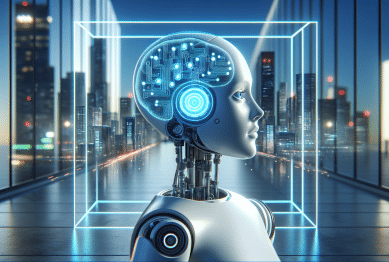Curious about how quantum computing reshapes technology? Explore the principles behind this rapidly advancing tech, how it challenges traditional computing, and what changes you may see in security, medicine, and artificial intelligence as researchers unlock quantum’s full potential.
What Makes Quantum Computing Unique
Quantum computing stands out because it leverages the bizarre properties of quantum mechanics, such as superposition and entanglement, to process information. Unlike classical computers, which use bits representing 0 or 1, quantum computers use qubits—quantum bits—that can exist in multiple states at once. This property gives quantum systems the ability to solve complex problems faster, sometimes exponentially so, compared to traditional devices. As quantum hardware matures, the intrinsic parallelism from superposition and the correlation from entanglement might enable breakthroughs unimaginable with today’s digital circuits.
Superposition allows qubits to represent both zero and one simultaneously. Entanglement, another quantum phenomenon, connects qubits in such a way that the state of one instantly determines the state of another, no matter the distance between them. This means quantum computers, when fully developed, may process massive datasets and calculate complicated variables at a scale far beyond classical machines. The science behind these principles continues to fascinate researchers, and pushing these boundaries could unlock further advancements, including new algorithms and efficiencies.
To understand why quantum computers can outperform classical computers on specific tasks, it’s important to recognize the role of quantum gates, similar to logical gates in binary systems. These gates manipulate qubits, permitting precise control over their state and interactions. As a result, quantum algorithms execute in unfamiliar but remarkably powerful ways. This paradigm shift challenges long-held beliefs about computational limits, encouraging discovery across physics, computer science, and engineering.
Current and Future Applications of Quantum Computing
Quantum computing’s unique strengths are already inspiring practical advancements across several industries. In cryptography, for example, quantum computers threaten existing standards, potentially exposing encrypted data through sophisticated algorithms such as Shor’s algorithm. Cybersecurity experts now explore quantum-resistant encryption to secure critical assets in a quantum-enabled future (https://www.nist.gov/news-events/events/2022/06/second-conference-advancing-quantum-resistant-standards). The race to develop robust defenses is accelerating as new knowledge emerges about quantum attacks.
Healthcare and pharmaceutical development may also feel the impact. Quantum simulations could model complex molecular interactions more accurately than classical computers, potentially speeding up drug discovery, personalized medicine, and the creation of better materials. For instance, scientists hope to use quantum algorithms for molecular modeling—a process that’s computationally intense with classical methods. The efficiency gains could lead to faster and more cost-effective research in biotech and medical treatments.
Another critical area is artificial intelligence and machine learning. Quantum computing may soon accelerate data analysis, optimize training of large neural networks, or help find patterns that would otherwise remain hidden within vast datasets. This boost could result in smarter AI models capable of driving innovation in sectors such as finance, transportation, and logistics, as companies seek to stay ahead by leveraging advances in computational science. As research harnesses quantum power, opportunities will grow.
The Challenges Facing Quantum Computing Adoption
Despite the promise, significant hurdles remain before quantum computers become commonplace. Qubits are extremely sensitive to environmental disturbances—known as noise—which leads to errors and “decoherence.” Ensuring quantum stability and increasing error correction capabilities are some of the biggest challenges researchers face today. Only with significant progress here can quantum systems become reliable for mainstream use.
Hardware limitations are still pervasive. Quantum computers need to operate at temperatures near absolute zero, requiring sophisticated cooling and shielding equipment. As a result, the technology is currently confined to well-funded labs and specialized research institutions rather than home or office environments. Advances in quantum chip design and materials science aim to address these limitations, but solutions may take years to emerge.
There’s also a shortage of professionals trained specifically for quantum development. The quantum ecosystem—covering hardware engineering, software development, and algorithm design—remains small relative to its needs. Universities and online platforms have begun offering specialized programs and free quantum courses, but growing a qualified workforce remains critical if this field is to scale. Promoting educational resources and encouraging interdisciplinary research are key to overcoming these hurdles (https://quantumcurriculum.mit.edu/).
Quantum Computing and Data Security
Quantum computing’s effect on encryption is one of its most-discussed aspects. Standard cryptographic systems rely on mathematical problems that would take conventional computers millennia to solve, but quantum algorithms threaten to break these defenses in far less time. Concerns are mounting over data security, as sensitive communications and transactions could become vulnerable if quantum computers become practical. Post-quantum cryptography research is now a high-tech priority, led by agencies and industry groups worldwide.
Recent advances have introduced quantum key distribution (QKD), which uses quantum mechanics principles to create theoretically unbreakable encryption channels. This technology, currently being tested in secure networks, could help protect financial data, government communications, and private information. QKD relies on the fact that observing a quantum state disturbs it, making eavesdropping detectable and enabling secure exchange of cryptographic keys (https://www.nccoe.nist.gov/projects/building-blocks/quantum-key-distribution).
While true quantum resilience will take years to finalize, many organizations are preparing now by investigating encryption algorithms that can withstand quantum threats. International standards committees, universities, and technology companies are all participating in this effort. Staying informed and engaged in these developments allows security professionals to adapt to innovations and minimize risks as the quantum era unfolds.
Pathways to Learning Quantum Computing
Quantum computing education is rapidly evolving, with resources now available for curious minds at every level. Some universities offer degree specialties, while other learners take advantage of free or structured online quantum computing courses provided by platforms like edX and IBM. These programs help demystify subjects ranging from quantum algorithms to superconducting qubit design and error correction strategies.
Online learning is particularly valuable for those without direct access to research labs. Interactive quantum programming environments, such as IBM’s Qiskit and Microsoft’s Quantum Development Kit, give users a hands-on introduction to real quantum systems. These platforms present both simulated and cloud-accessible quantum computers that help students and professionals develop coding skills and experiment with real-world algorithms.
Collaborations between universities, industry partners, and government agencies support wide access to quantum learning resources. Initiatives like the Quantum Open Source Foundation promote open research and education tools, while private sector investment grows educational outreach. Exploring such resources makes quantum computing approachable for beginner and expert alike, building a foundation for future innovation (https://quantum.country/).
How Quantum Will Reshape Industries
As quantum hardware matures and error-correction improves, industries may see profound changes. In logistics, quantum optimization algorithms could make supply chains more efficient, finding better routes and resource allocations almost instantly. In finance, faster modeling and risk analysis could transform investment strategies. Energy and materials science also stand to benefit, with quantum cheminformatics improving solar cell design and battery chemistry.
Climate science and weather modeling are especially demanding for traditional supercomputers but may become more tractable with quantum resources. These advancements could improve weather prediction, flood warnings, and climate monitoring, supporting both public safety and business continuity across critical sectors. As quantum hardware and software evolve, integration with existing technologies remains a crucial step to realizing these outcomes.
Collaboration and regulatory frameworks will be essential as industries navigate the ethical, legal, and operational risks associated with this disruptive technology. Preparing internal teams, clarifying governance, and supporting continuous workforce education are leading strategies for organizations hoping to harness the advantages of quantum innovation while addressing practical constraints.
References
1. National Institute of Standards and Technology. (n.d.). Second Conference on Advancing Quantum Resistant Standards. Retrieved from https://www.nist.gov/news-events/events/2022/06/second-conference-advancing-quantum-resistant-standards
2. Massachusetts Institute of Technology. (n.d.). MIT Quantum Curriculum. Retrieved from https://quantumcurriculum.mit.edu/
3. National Cybersecurity Center of Excellence. (n.d.). Quantum Key Distribution: Building Block. Retrieved from https://www.nccoe.nist.gov/projects/building-blocks/quantum-key-distribution
4. Quantum Country. (n.d.). Quantum Computing Learning Tools. Retrieved from https://quantum.country/
5. IBM Quantum. (n.d.). Qiskit: Quantum Development. Retrieved from https://qiskit.org/
6. Quantum Open Source Foundation. (n.d.). Education and Research Initiatives. Retrieved from https://qosf.org/









